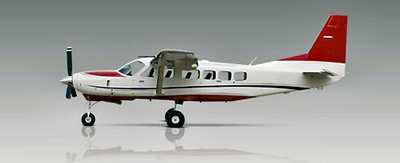Fri, Mar 22, 2013
Pilot, One Passenger Fatally Injured In October, 2011 Accident
The pilot of a Cessna Caravan (similar airplane pictured. Not accident aircraft) which went down in Canada's Northwest Territories (NWT) was impaired by marijuana use, according to a report from the Canadian Transportation Safety Board. The pilot and one passenger were fatally injured, and two other passengers survived with serious injuries.

According to the report, the Air Tindi Ltd. Cessna 208B Caravan (registration C-GATV, serial number 208B0308) departed Yellowknife, Northwest Territories, at 1103 Mountain Daylight Time under visual flight rules as regularly scheduled flight Air Tindi 200 (AT200) to Lutsel K'e, Northwest Territories. When the aircraft did not arrive at its scheduled time, a search was initiated, and the aircraft was found 26 nautical miles west of Lutsel K'e, near the crest of Pehtei Peninsula. The pilot and one passenger were fatally injured, and two passengers were seriously injured. There was no post-impact fire, and no emergency locator transmitter signal was received by the Joint Rescue Coordination Center or search aircraft.
The pilot reportedly was certified to fly the Cessna, having completed a VFR pilot proficiency check ride in March 2011, followed by company line indoctrination on type. He did not pass a renewal Group 3 (single-engine) IFR check-ride due to difficulties with GPS use, but after additional training, he passed a second IFR check-ride on 18 August 2011. All the pilot's revenue flights in the C208 as captain were under VFR conditions. The weather at the time of the accident was reported to consist of overcast layers from 2000 to 4000 feet asl with tops at 24 000 feet asl, and scattered altocumulus castellanus topped at 22 000 feet asl. Predicted localized visibilities were from 3 to more than 6 statute miles (sm) in light rain showers and mist, and patchy ceilings were from 800 to 1500 feet agl. Moderate mixed icing was predicted above the freezing level (5000 feet asl).
Post-mortem toxicological screening revealed the presence of cannabinoids in the pilot's system. Femoral blood contained 50.1 nanograms per millilitre (ng/ml) of delta9-tetrahydrocannabinol (delta9-THC), and 21.6 ng/ml of carboxy-THC. Pleural fluid contained 11.9 ng/ml of delta9-THC, as well as 41.8 ng/ml of carboxy-THC. Urine contained 272 ng/ml of carboxy-THC. Considering the significant amount of THC in the pilot's blood, the TSB considered confirmation by retesting. The small quantity of remaining femoral blood sample precluded retesting. A blood delta9-THC concentration over 5 ng/ml is the threshold considered to be necessary for possible impairment. Even allowing for a reasonable margin of error in the toxicology results, the amount of THC present in this occurrence is considerably greater than the threshold that resulted in degraded pilot performance in studies on the impairing effects of THC.
More News
Option Approach An approach requested and conducted by a pilot which will result in either a touch-and-go, missed approach, low approach, stop-and-go, or full stop landing. Pilots >[...]
"Emirates is already the world's largest Boeing 777 operator, and we are expanding our commitment to the program today with additional orders for 65 Boeing 777-9s. This is a long-t>[...]
(Pilot) Reported That There Was A Sudden And Violent Vibration Throughout The Airplane That Lasted Several Seconds Analysis: The pilot was returning to his home airport at an altit>[...]
“This recognition was evident during the TBMOPA Annual Convention, where owners and operators clearly expressed their satisfaction with our focus on customer service, and enc>[...]
Overhead Maneuver A series of predetermined maneuvers prescribed for aircraft (often in formation) for entry into the visual flight rules (VFR) traffic pattern and to proceed to a >[...]
 ANN's Daily Aero-Term (11.19.25): Option Approach
ANN's Daily Aero-Term (11.19.25): Option Approach Aero-News: Quote of the Day (11.19.25)
Aero-News: Quote of the Day (11.19.25) NTSB Final Report: Sting Sport TL-2000
NTSB Final Report: Sting Sport TL-2000 Aero-News: Quote of the Day (11.20.25)
Aero-News: Quote of the Day (11.20.25) ANN's Daily Aero-Term (11.20.25): Overhead Maneuver
ANN's Daily Aero-Term (11.20.25): Overhead Maneuver



